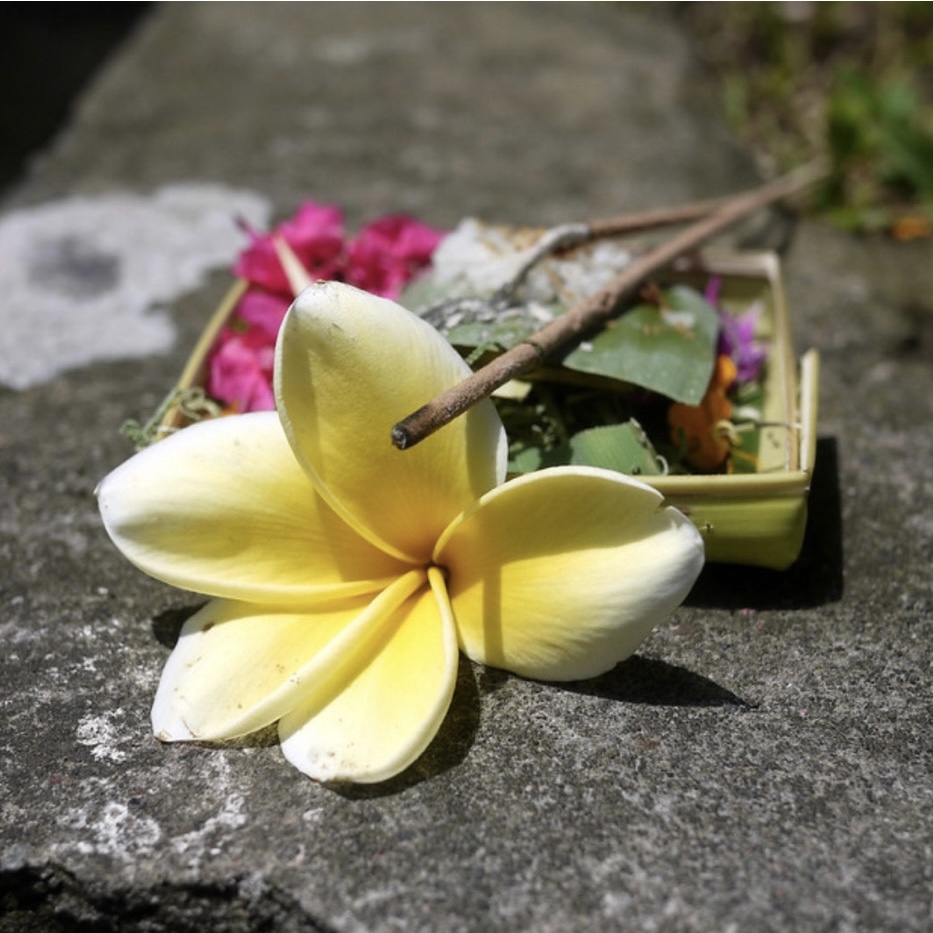When I came to Bali, I eagerly anticipated a tropical dreamland. My instagram feed promised white sand beaches sprinkled with infinite pools, $6 massages, opulent night clubs, lush jungle fauna, undulating hills festooned with rice paddies, and pious Hindu women arrayed in colorful sarongs humbly presenting offerings at the local temples. I expected to step through an instagram filter into a world dripping with beauty.
I found all of these things. My camera never stopped clicking. But as the days passed, I began noticing something even more profound than this ocular feast. I noticed that every single native person who I had encountered was smiling. These were not the saccharine smiles of people working in the service industry trying to accrue tips. These were smiles that radiated a calmness, a serenity, and a genuine joy that reached into my heart and moved me deeply. This palpable joy that I witnessed created a collective energetic current that percolated throughout the island. I became intrigued to the point of obsession.
How could an entire culture of people residing together on an island the size of Delaware all be so inexplicably happy? These people lives humbly – many in villages on the outskirts of the larger cities. 80% of them worked jobs in the tourism industry. The natives I encountered daily were taxi drivers, restaurant servers, hotel clerks, and massage therapists. I did not encounter poverty, but I did not encounter material wealth either. Most of them had very little, but wanted for nothing. Was it the brilliant sun and the island’s incredible aesthetics that had the power to imbue an entire culture of people with a sense of nirvana-like contentment, I wondered?
I decided to go on a quest to find out. Everyone I encountered for the month that I resided on the inland town of Ubud, I asked, “Hey, why do you think the Balinese people are so happy?” Everyone – smiling and chuckling at my question – gave me essentially the same answer. This answer brought me to my knees. It was so simple and obvious. There was a life philosophy that they lived by, they explained, that was deeply imbedded in the Balinese way of life. It was not religiously oriented despite the island being predominately Hindu. In fact, I would go so far as to call it a philosophy that called for a conscious mood-decision in response to a basic scientific truism.
Remember learning the Newtonian law that to every action there is an opposite reaction? The Balinese believe that there are two opposing forces that are required to maintain universal balance. This concept, they coin “Raw Bhineda. “Raw” means two” and “Bhenida” means opposites.
The Balinese believe that everything exists as a duality. This duality is what brings about a cosmic balance to the universe. So, if there is good, evil must exist to bring balance. Birth balances death, joy balances sorrow, young balances old, positive balances negative, health balances sickness, and so forth. The universe constantly adjusts itself to bring about the perfect equilibrium.
Balinese children are taught by their parents to not linger too long in sadness, for joy is on the way to balance it. Likewise, joy is not worshiped to a gluttonous degree for it too will be balanced out by sadness in time. This philosophy of “okayness” with life in all of its polarities emphasized an “appreciation of differences” rather than fearing or antagonizing them.
In essence, this is a philosophy of “acceptance” rather than “judgement.” Much like the Buddhist philosophy of maintaining equanimity as the antidote to suffering, and the Taoist concept of Yin and Yang, this is a concept of transcending the human impetus to avert pain and seek pleasure. However, the Balinese have taken it one step further by impregnating this concept with a truly remarkable attitude of “non-judgement.” The philosophy encourages acceptance of the good and the bad that you see in other people – for everyone has strengths and weaknesses. It encourages acceptance of the good and bad that you perceive in yourself – for you are a work in progress, and your imperfections are ok. It encourages acceptance of the positives and negatives that you perceive in every situation and bit of information that you download on a moment to moment basis. This is the key to okayness. And okayness is a foundational precursor to happiness.
The Balinese I interviewed further explained to me that they even take this one step further, from okayness, to gratitude. The Balinese have mastered an “attitude of gratitude.” The word “Bali” itself means “offering.” Balinese Hindu women generally spend an hour or more per day preparing offerings of rice, fruit, cakes, incense, and/or flowers arranged in banana leaves and leaving them in various locations around the family compound and local city. These offerings represents gifts of gratitude to the gods. Philosophically speaking, this daily practice of humble reverence through these “tributes to the gods” creates a cultural undercurrent of thankfulness. And this spirit of thankfulness is contagious as one walks down the city streets – seeing these lovely offerings sitting on curbsides, motorbikes, and by statues.
So, I return from Bali with a newfound personal quest – to be “okay” with everything that transpired in my life. I have a lot of growth to do in this department. I’m excited to flex my “okayness” and “gratitude” muscles to the point that they become my default.
Furthermore, I am learning to say “Thank you for…” and “I am grateful for” silently to myself throughout the day. Many religious traditions wisely encourage prayers upon waking, before meals, or incrementally throughout the day. Gratitude, however, does not have to exclusively be a religious practice. It is a tool that we can all utilize to increase the quality of our lives – and in doing so, collectively elevate our cultural consciousness.
One of my taxi drivers who I interviewed encouraged, “Starting first thing in the morning, recognize the little things that you delight in on a daily basis. For instance, your morning coffee, your warm shower, and your delicious omelette – this is the key to overall happiness.” There are truly so many things that we have to be grateful for every moment of every day. When we delight in the “small daily things” our “attitude of gratitude” becomes our way of life.
The knowledge of Rwa Bhineda was the gift that Bali gave to me. What do you think? Want to try out Rwa Bhineda with me? :):)

